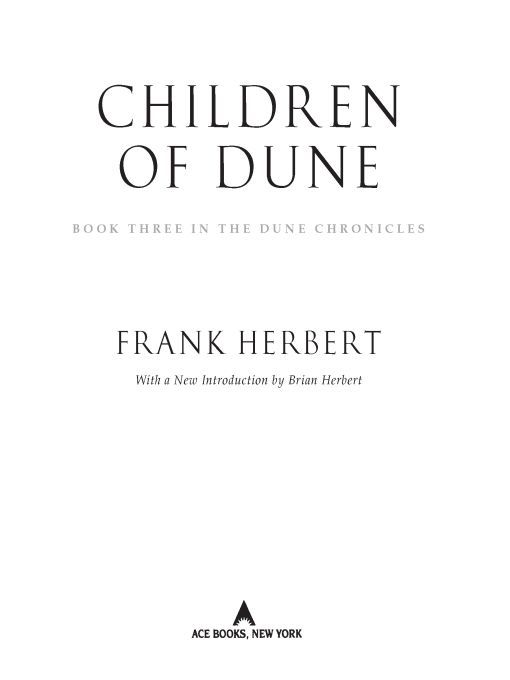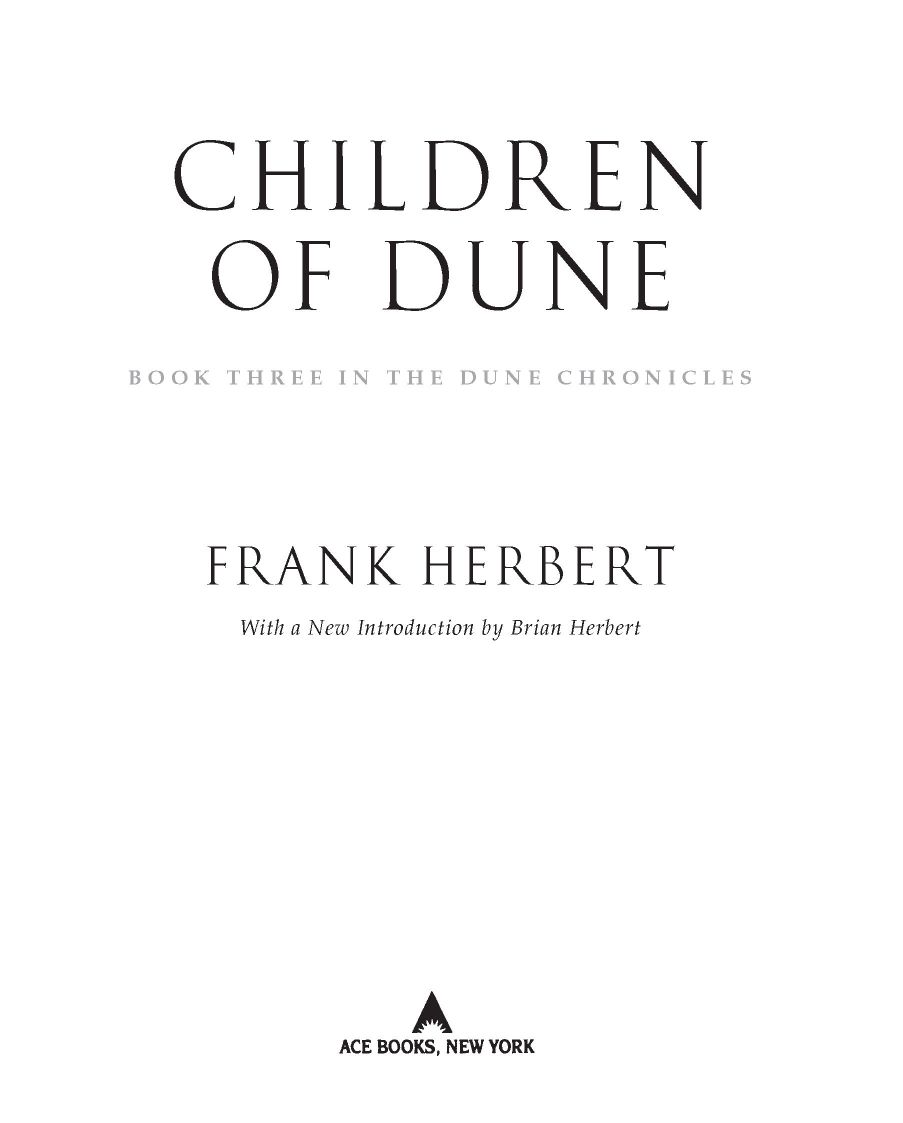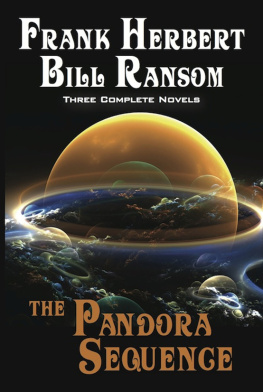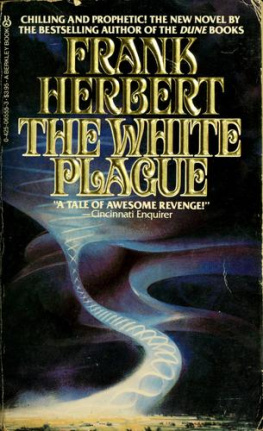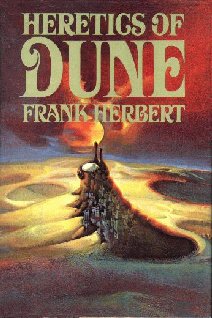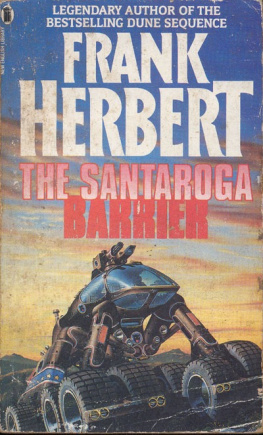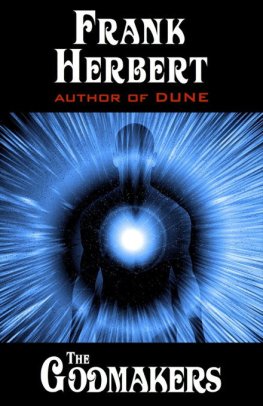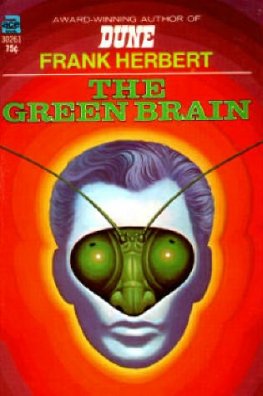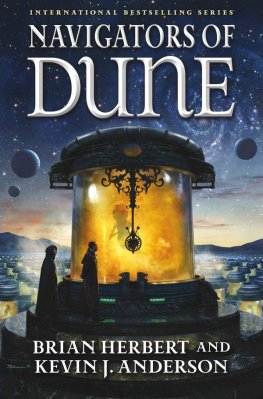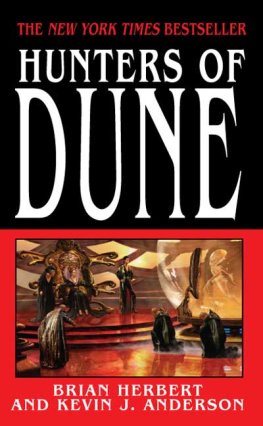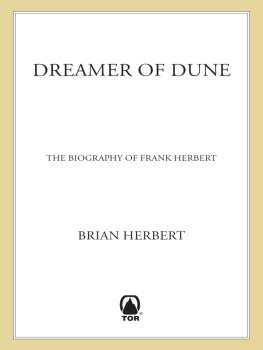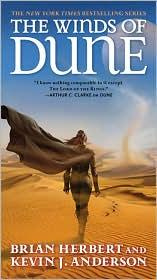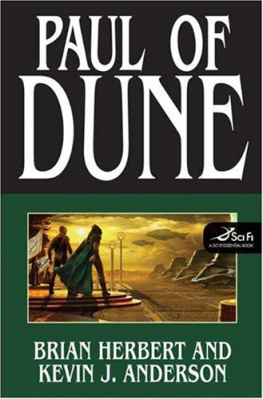Table of Contents
Books by Frank Herbert
THE BOOK OF FRANK HERBERT
DESTINATION VOID (revised edition)
DIRECT DESCENT
THE DOSADI EXPERIMENT
EYE
THE EYES OF HEISENBERG
THE GODMAKERS
THE GREEN BRAIN
THE MAKER OF DUNE
THE SANTAROGA BARRIER
SOUL CATCHER
WHIPPING STAR
THE WHITE PLAGUE
THE WORLDS OF FRANK HERBERT
MAN OF TWO WORLDS
(with Brian Herbert)
The Dune Chronicles
DUNE
DUNE MESSIAH
CHILDREN OF DUNE
GOD EMPEROR OF DUNE
HERETICS OF DUNE
CHAPTERHOUSE: DUNE
Books by Frank Herbert and Bill Ransom
THE JESUS INCIDENT
THE LAZARUS EFFECT
THE ASCENSION FACTOR
Books edited by Brian Herbert
THE NOTEBOOKS OF FRANK HERBERTS DUNE
SONGS OF MUADDIB
FOR BEV: Out of the wonderful commitment of our love and to share her beauty and her wisdom for she truly inspired this book.
INTRODUCTION
by Brian Herbert
Frank Herbert had a remarkably inventive and original mind. In his first novel, The Dragon in the Sea (1956), he came up with the concept of containerized shipping, an idea that the Japanese later commercialized to enormous success. Dune, only his second novel, was published in 1965. A complex, revolutionary work, it featured layers of ecology, philosophy, history, religion, and politics beneath the epic tale of the heroic Paul Atreides.
By 1968, five more of Frank Herberts novels had been published: Destination: Void, The Eyes of Heisenberg, The Green Brain, The Heaven Makers, and The Santaroga Barrier. All the while, the popularity of Dune was growing, particularly among university intellectuals who were impressed by the complex messages interwoven into the great adventure story. The novel became a textbook for many classes. The Whole Earth Catalog extolled it as an environmental handbook.
As his eldest son, I didnt even know what my father had created. In 1966, I was hitchhiking near Carmel, California, and a young hippie couple gave me a ride in their Volkswagen Beetle. I was sitting in the back of the small car as it puttered along, and we were chatting. I told them that my dad was a newspaperman for the San Francisco Examiner and that he had written a couple of books.
Oh? the young man said. What did he write?
Uh, Dune, I said.
Dune! He was so excited that he pulled the car off to the side of the road. Your dad is Frank Herbert?
Hesitantly I replied, Yeah.
Dune! I love that book! One of my friends at college turned me on to it. Wow! I cant believe it!
I was dumbfounded. As I wrote in Dreamer of Dune, my biography of Frank Herbert, my bearded father and I did not get along well in those years. I was a rebellious teenager, and we had one shouting argument after another. The relationship seemed hopeless. But Dad had apparently written something remarkable. Even so, he was not making much money from his writing or from his newspaper job. As a family, we were on the poor side of average, and some of our relatives considered my father something of a black sheep. He was eccentric, they said, and went his own way. How little did they know. How little did I know. I hadnt even read the novel yet.
Dune Messiah, Frank Herberts first sequel to Dune, was published in 1969. In that book, he flipped over what he called the myth of the hero and showed the dark side of Paul Atreides. Some readers didnt understand it. Why would the author do that to his great hero? In interviews, Dad spent years afterward explaining why, and his reasons were sound. He believed that charismatic leaders could be dangerous because they could lead their followers off the edge of a cliff.
His alternate way of looking at the universe fascinated many readers anyway, and they couldnt wait to see where he was going with the series. He was developing a core readership. In the early 1970s, Frank Herbert became involved with the environmental movement, just as the popularity of the novel Dune was skyrocketing. He spoke on college campuses all over the country. Readers wanted even more sequels, but Dad took his time with the third book, wanting the next novel in the series to be as skillfully written as possible. In conjunction with the first Earth Day, Dad wrote entries for and edited New World or No World, a book about the importance of protecting the environment. He followed that with two novels, Soul Catcher and The Godmakers, and then a third, Hellstroms Hive, which had a movie tie-in. His book Threshold: The Blue Angels Experience was also published with a film connection.
By 1976, Frank Herbert had completed his long-awaited sequel, which he titled Children of Dune. A four-part Analogy serialization of the novel early that year was a resounding success, causing issues to sell out at news-stands. Letters poured in from excited fans who loved the story.
For months, David Hartwell, Dads astute editor at G. P. Putnams Sons, had been trying to convince company management that they were not printing enough copies, that when Children of Dune was printed soon in hardcover, it was going to be a national best seller purchased by more than science fiction fans. Like Dune, it would be a genre buster, he said.
Dune itself had not made it onto very many best-seller lists since its popularity had been a gradual groundswell. Its sales since publication were impressive, though, and Dune Messiah had sold relatively well. But Dune Messiah hadnt been favorably received by the critics, and consensus held that its sales came on the coattails of Dune. Would Children of Dune be an even bigger critical disappointment than Dune Messiah?
There had never been a hardcover science fiction best seller, so Putnam management proceeded with extreme caution. Suddenly the Analog results provided David Hartwell with the necessary ammunition. Putnam increased the first print run to 75,000 copies, more than any science fiction hardcover printing in history. Publication was scheduled for later in the year, after completion of the magazine serialization.
When Children of Dune came out in hardback in 1976, it was an instant best seller. True to the prediction of David Hartwell and the gut feeling of my father, it became the top-selling hardback in science fiction history up to that time... more than 100,000 copies in a few months. When the novel came out in paperback the following year, Berkley Books initially printed 750,000 copies. That wasnt half enough, and they went back to press. Six months after the release of the paperback, Dad said paperback sales were approaching two million copies.
Its a runaway best seller, he told me in a telephone conversation. Dad enjoyed this phrase, and I heard it often in the ensuing years regarding his numerous best sellers.
At the age of fifty-five, Dad went on his first book tour, and it was a big onetwenty-one cities in thirty days, including an appearance on The Today Show in New York City with fellow science fiction writers Frederik Pohl and Lester del Rey. The Literary Guild made arrangements to offer all three books of the Dune trilogy in a boxed hardbound set.
At the vanguard of an explosive growth of sales in science fiction, Frank Herbert blazed the trail for other writers in the genre. After the phenomenal success of the Dune series, Isaac Asimov, Arthur C. Clarke, Robert A. Heinlein, Ray Bradbury, and other science fiction writers had national hardcover best sellers.

